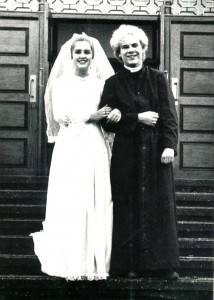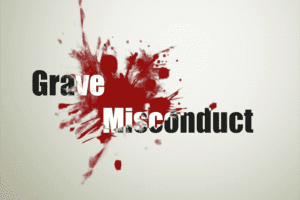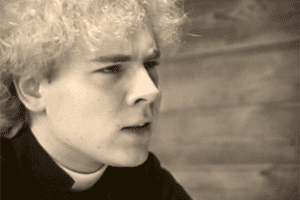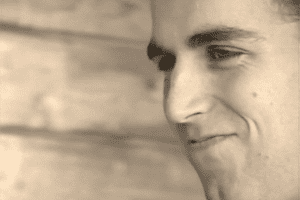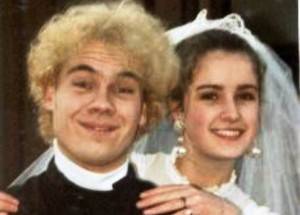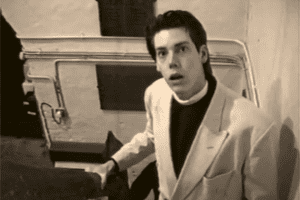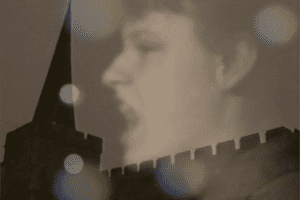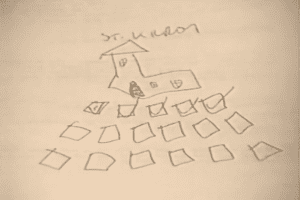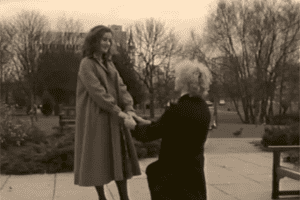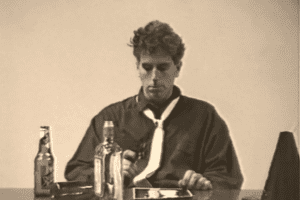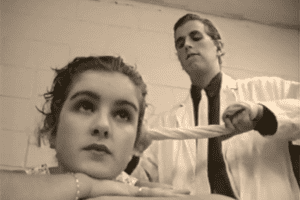In 1990 I was the resident videographer at Bowes Lyon House, a youth centre and arts venue in my home town of Stevenage that would transform once a week into Thee Klub Wiv No Name attracting artists such as The Ragga Twins, The Bleach Boys and The Cranberries, I was tasked with capturing the live performances on tape.
At the time I was an active member of The Bancroft Players a renowned drama society based at the Queen Mother Theatre in the neighbouring market town of Hitchin. Mike Lukey, my best friend from my early school days, was the keyboardist and songwriter for local band Budadada, now known as the New Town Centres.
The pair of us had tried in vain to make the eponymous Ex & Lukes: The Motion Picture on Super 8 cine film whilst we were still at school and we hit on the notion that we could borrow the camcorder from Bowes Lyon and use it to finally get a movie made and within a couple of weeks we had knocked up a script, gathering a small cast of friends from the theatre group and the band together, many of whom had never acted before.
The plot revolved around the exploits of two supposed pillars of society, Reverend Laurence Dressing (Ex) and Doctor Paul Toombes (Lukes) whose twenty year friendship had seen them descend into corruption leading to murder, incest and ultimately, for the Doctor at least, suicide. It was thought that in order to help me age for the role of the Vicar my curly locks should be bleached white, however due to the natural amount of red in my hair the best the barber could manage was straw yellow, which appeared either orange or green under different light, leaving us no choice but to present the film in black and white.
Whilst the themes were dark the subject was treated as a black comedy, satirising the privatisation policies of the Thatcher government of the day and pondering what might have happened had the Church of England been subject to stringent, commercial, market pressures; enter Archbishop Dorsal Fine played by the stalwart of the Bancroft Youth Theatre Julian Newman Turner, he gives the Vicar one last chance to turn around the fortunes of the church of St. Kilroy before it’s listed for demolition and the land redeveloped.
Reverend Dressing has a more sinister motive for saving the church, for walled up in its belfry is the corpse of a fallen lady from his past who took to blackmail when she fell pregnant by him. The Vicar called upon his good friend and hypnotist Doctor Toombes to discretely dispose of the troublesome woman. If the church is torn down their little secret would be discovered giving them no alternative but to revitalise the church coffers in the easiest way possible by generating an increased demand for funerals and the copious costs that accompany them.
We were actually allowed to film in St. Nicholas church in Old Stevenage on the pretext that this was a community story about a group of local people trying to save the parish church. With the same cunning we were able to convince the Director of Bowes Lyon to let us keep the camera over the course of one weekend (usually we had to return it before the offices closed) and this single exception provided the chance to shoot the requisite spooky night scenes in the woods; no self-respecting, low-budget movie would be complete without them!
Once the Doctor had dispensed with the bulk of his regular patients thus filling St. Kilroy’s graveyard, the second act introduces the character of Georgina played by Claire Garvie, who had recently starred as Sandy in the Lytton Players production of Grease at the Gordon Craig Theatre. Georgina worked at the local nursery and was involved in a fatal car accident resulting in the death of a young child for which she held herself responsible. During a visit to Reverend Dressing for spiritual guidance his dog collar slips once more and he embarks on a May to September fling with Georgina that quickly escalates to talk of marriage; perhaps the clergyman believes he can find salvation by rescuing the young, troubled girl.
Georgina also visits the clinic of Doctor Toombes for counselling and whilst under hypnosis it’s revealed through flashbacks that perhaps he isn’t completely evil after all; whilst he did-away with the pregnant woman from his pal’s past, he managed to save the baby and delivered her to the Salvation Army where she was fostered. Once he realises that the Vicar is about to marry his own daughter unwittingly, this tragedy of Greek proportions is too much for the Hippocratic practitioner to bear and the guilty knowledge sets him in a tailspin of depression and madness culminating in death by his own hand.
Grave Misconduct was originally shot on a Panasonic M10 VHS camera and edited in the linear fashion direct to U-Matic Beta-SP master tape over the course of two days. The equipment available at the time didn’t allow for complex effects, transitions or sound montage and the original now feels a little tired and slow by today’s standards.
Lukes did a very short edit which played more like a trailer to commemorate the film’s first decade but I thought it would be a worthwhile exercise to produce a brand new edition to celebrate the film’s 21st anniversary using my new found skills with Final Cut Pro X. I wanted to remove a lot of the glitches from the original that have bothered me over the years whilst keeping the storyline and key performances intact; by cutting 21 minutes of footage and introducing an alternative soundtrack I have injected much more pace and energy into it and I now consider this to be the definitive version.

